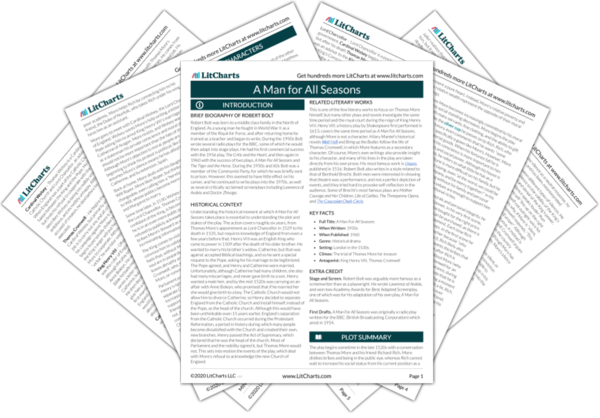Financial vs. Moral Richness
Over the course of the play, Thomas More’s fortune falls metaphorically (as he falls out of the King’s graces) and literally (as he becomes poorer as a result of his lower social standing). In contrast, More’s onetime friend Richard Rich becomes wealthier and wealthier from scene to scene—the two men’s relative fortunes are mirror images. Although from the outside Rich looks like the more successful of the two men, Robert Bolt demonstrates appearances…
read analysis of Financial vs. Moral RichnessThe Meaning of Silence
In A Man For All Seasons, silence is powerful, but only because it is open to interpretation. Thomas More uses silence as a tool to protect himself and his family, believing that silence is truly neutral. By speaking, he knows he will incriminate himself, whereas by keeping silent he hopes to remain innocent in the eyes of the law. Unfortunately, to Cromwell, and—more importantly—to Henry VIII, silence is not neutral; it is…
read analysis of The Meaning of SilenceConscience, Integrity, and Reputation
Consciences are personal moral compasses that help a person tell right from wrong, but in A Man For All Seasons, private moral codes become public spectacles. King Henry’s guilty conscience over his (potentially illegitimate) first marriage causes him to demand that the public, and Thomas More, comfort him and assuage his guilt. More’s conscience, which acts as a religious compass, steers him towards his eventual death, because he cannot go against his…
read analysis of Conscience, Integrity, and Reputation
Man’s Law vs. God’s Law
Thomas More values law and order. He uses the law to work out personal and moral dilemmas, and uses it as a rational shield against Cromwell and the King. Although More is religious and hopes to be rewarded for his moral behavior in the afterlife, religion and God’s laws are sometimes confusing to him. Bolt uses the symbols of water, tides, and the sea to represent religion and the afterlife because water is “the…
read analysis of Man’s Law vs. God’s LawFriendship
In A Man For All Seasons friendships, which are traditionally sources of comfort and joy, instead become dangerous. The Duke of Norfolk, for example, is put in danger by his friendship with Thomas More, as it leads the King and others to assume that the Duke shares More’s traitorous opinions. Other friendships are harmful because they come with expectations—the King calls More his “friend,” and uses this connection to sway More politically. Still…
read analysis of Friendship






